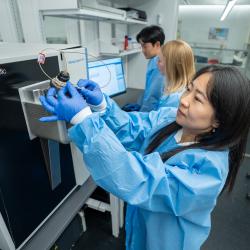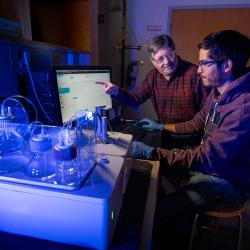Finding the Beauty in Chemistry
Cosmetic chemist Ama Gyedu (B.S. ’17, chemistry) blends artistry with science to develop new and improved formulations for personal care products like makeup and perfume.
Growing up, Ama Gyedu (B.S. ’17, chemistry) was a big fan of teen fashion magazines like Seventeen. She fondly remembers spending hours poring over glossy spreads with her closest childhood friend, taking notes on how celebrity fashionistas expertly played with colors and patterns as mediums for self-expression.

As Gyedu got older, she learned how to apply some of those tips and tricks for herself. With practice, she eventually refined her own eclectic and colorful style. By the time she reached high school, she wanted to take her skills to the next level after discovering the glamorous world of online fashion influencers and makeup gurus.
“This was during the height of the YouTube beauty craze in the 2010s and I was obsessed,” Gyedu recalled. “Ironically, I wasn’t allowed to wear makeup while I was in high school, so I was experimenting only with fashion. But I knew early on that I wanted to work with makeup as well. I decided that I wanted to help other people find their personally unique color combinations just as I had—and to be confident and comfortable in their own skin.”
Today, Gyedu is living that dream. As an “innovation chemist” at Symrise AG, a multinational producer of flavors, fragrances and cosmetic ingredients, she works to formulate, reverse engineer or improve cosmetic products for big-name clients like Procter & Gamble. From scented shampoos and moisturizing lotions to bright lipsticks and high-coverage foundations, Gyedu has helped to develop a vast array of products so that customers can tailor their own personal care regimens to their unique needs.
These achievements, she said, were driven by her childhood dream and some guidance from the University of Maryland’s Department of Chemistry and Biochemistry.
“When most chemistry students are asked to think about what they can do with their degree, they probably think of working in academia or maybe a pharmaceutical lab somewhere,” Gyedu said. “In that way, cosmetic chemistry is kind of a niche path because it’s not usually the first conclusion people come to. I wouldn’t have known that it was a viable path either, if not for a chance encounter with someone from UMD years ago. It took a lot of hard work and a little luck to end up where I am today.”
Color complements chemistry
For Gyedu, her journey in cosmetic chemistry started on a seemingly ordinary day at Northwestern High School in Prince George’s County, Maryland, when a student from UMD’s Department of Chemistry and Biochemistry came to visit the school as part of a STEM outreach program.
“I can’t remember her name now, but I do remember her talking about her dream to be a cosmetic chemist," Gyedu said. “She was so passionate about joining the beauty world after she completed her degree at UMD and creating her own makeup formulations.”
The student’s enthusiasm was contagious and Gyedu realized that it was possible to combine her talent in science and understanding of color theory to achieve her goals.
“Something in my brain just clicked. I thought ‘Wow, this seems doable—I’m good at chemistry and I want to dive deeper into the beauty world, so why not?’’” she said.
Inspired, Gyedu applied to study chemistry at UMD. Once on campus, she quickly became active in organizations like the student chapter of the American Chemical Society. Gyedu also worked as an undergraduate researcher in the nanoparticle laboratory of Zhihong Nie, who was an assistant professor of chemistry and biochemistry at the time. There, Gyedu got her first taste of working in a research lab and learned how to develop, evaluate and improve formulas for dental fillings. That experience allowed her to preview how her chemistry training could be actively applied to create a product that would be directly beneficial to the average person in everyday life.

After graduating from UMD and networking extensively with professionals in the cosmetics industry, Gyedu got a job as an experimental applications chemist with Givauden, a Swiss multinational manufacturer of flavors and fragrances. There, she learned how to make custom fragrances using raw materials and base fragrance oils for clients—all under strict confidentiality agreements, something she realized was common for all major chemical companies.
“Many of the products we use every day have more or less the same ingredients as their competitors, but there’s often a difference in concentrations that can drastically change the product. One tiny tweak can change a product’s effects,” she explained. “The list of ingredients on the back of every product tells us what’s in there and the order of the ingredient list tells us the general percentage amount of the ingredient in the product. Part of my reverse engineering work as a cosmetics chemist is to figure out what that proprietary amount is.”
Gyedu also had the chance to put her passion for color to the test while working for cosmetic companies Estée Lauder in 2019 and Shiseido in 2021, where she matched shades, mixed pigments and tweaked formulas for foundations, concealers and lipsticks. The work required exceptional precision, skills that she learned both as a chemist and as a color enthusiast.
“Everyone is different, so we can all react very differently to the same chemicals in any given product,” Gyedu said. “And the same goes for how our differing skin types and textures can respond differently to ingredients in products. Being able to pinpoint the exact—or nearly identical—performance for a formula, while successfully satisfying the client, is one of the most fulfilling parts of the job.”
Making her mark on the beauty industry
Like any chemist working in a lab, Gyedu ran into challenges along the way with her formulations. She jokingly calls it an occupational hazard but also a gift that keeps on giving.
“It’s easier to screw up a few times than to automatically come up with a successful formulation,” Gyedu laughed. “It usually takes a few trials to develop a product that fully ticks off every box a client might have: viscosity, pH levels, preferred active ingredients or pigments, fragrances, overall stability and more. Luckily—or maybe unluckily—I get to keep some of the failed or less successful samples I produce for myself.”
But Gyedu continues to look toward the future and has big aspirations, including a possible return to school for a master’s degree in cosmetic sciences—a specialty program offered by many universities near her in New York and New Jersey. By taking advantage of the cosmetics industry hub thriving around her, Gyedu hopes to hone her skills to eventually become a cosmetic product developer.
“Even though it sounds like it’s what I’m doing now as a cosmetics formulation professional, product development has a much broader scope,” she explained. “It requires some nuanced knowledge of what will sell well in our current market, for example, and help narrow down and perfect products using that insight. There’s more to the job than creating formulas.”
Gyedu believes that as consumers learn more about their everyday personal care products through the internet and social media, the demand for specialized formulations prioritizing clean, ethically sourced yet effective active ingredients will also increase. She hopes that her professional background in formulation as well as her personal experiences with cosmetics will help keep her in step with those trends.
“I think I’m uniquely positioned to make a difference in the beauty world,” she said. “It just feels like the next logical step for me to continue empowering people to feel comfortable and confident, to be their best selves.”







